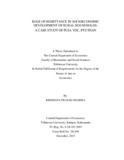Please use this identifier to cite or link to this item:
https://elibrary.tucl.edu.np/handle/123456789/2153| Title: | Role of Remittance in Socioeconomic Development of Rural Households: A Case Study of Puja Vdc, Pyuthan |
| Authors: | Sharma, Krishana Prasad |
| Keywords: | Remittance;Socioeconomic surveys;Rural Households;Pyuthan |
| Issue Date: | Dec-2015 |
| Publisher: | Central Department of Economics Tribhuvan University, Kirtipur, Kathmandu |
| Abstract: | The principal theme of this study is to analyze the extent to which the remittance transfers impact on socioeconomic development of rural households. Required data was collected from Puja VDC of Pyuthan district by proportional random sampling method using a pre-structured questionnaire. Data were analyzed by using simple statistical tools like mean, percentage, and ratio. Inequality was measured using Gini-coefficient and Lorenz Curve techniques. The key findings of the study are that reasons to seek foreign employment include unemployment and family debt burden; remittance has increased the socioeconomic condition of the households and played vital role in alleviating poverty; a larger amount of remittance income has been used for household expenses followed by loan repayment and social activities; most of the returnees are unable to apply their skills learnt from foreign employment; income inequality in the study area has been quite high after remittance transfer which widens Gini-coefficient from 0.48 to 0.61. Remittance has been extremely important to Nepal as the country has ranked at the top among the remittance recipient LDCs relating to the share of the GDP. Remittance has emerged as one of the most fruitful panacea to get rid of many problems. Official remittances have grown by an average of 24% over the past 10 years and if the growth rate is continued remittance will exceed the total GDP of Nepal in 2020. This study suggests that the government needs to reduce the high cost incurred for migration; stop the activities of brokers and agents who exploit the potential migrants; stop physical torture against women migrants; channel remittance into productive sectors of the economy including small and micro enterprises through financial intermediaries; set up a separate bank for providing loans for foreign employment; provide skill development training before going to abroad and provide opportunities to utilize newly learnt skills from foreign employment. Remittance has succeeded creating essential pre-conditions of development. If remittance and other resources are properly managed through policy programmes, the economy has now reached the stage from where we can expect sustained growth and development with further reduction in poverty and inequality in coming years. |
| URI: | http://elibrary.tucl.edu.np/handle/123456789/2153 |
| Appears in Collections: | Economics |
Files in This Item:
| File | Description | Size | Format | |
|---|---|---|---|---|
| KP Sharma Finalized Thesis to Print.pdf | 1.35 MB | Adobe PDF |  View/Open |
Items in DSpace are protected by copyright, with all rights reserved, unless otherwise indicated.
